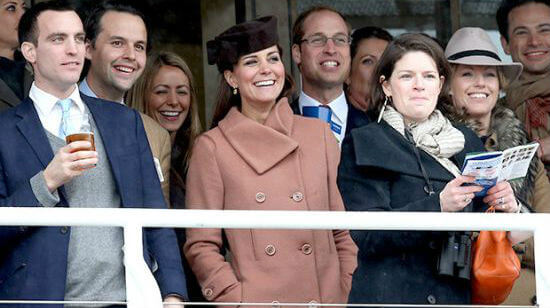It seems that there’s no limit to what people will stake money on these days.
As we recently reported, the Scottish Referendum attracted a huge volume of wagers including the largest ever political bet.
And sites like Comeon!, which offers a comprehensive sportsbook, will often allow you to wager on various ‘non-sporting’ events or outcomes like this.
But how about betting on the likelihood of a mother giving birth to twins? What online betting site or for that matter high street bookies is going to offer prices on such a mundane event?
Well, we’re not talking about any old mother here…
Kate Middleton, wife of the second person in line to the UK throne, and mother of the third in line, is set to give birth to her second child in 2015.
And the announcement last month has seen a slew of bets being placed on the happy day yielding not one but 2 younger siblings for Prince George, who was born in July 2013.
In fact, after receiving 200 such wagers in just one HOUR, William Hill has been forced to suspend all further bets on the outcome, and other high street shops have had to slash their odds — figures as short as 5:2 have been reported.
Now, we think the chances of having twins are much lower than that — so what’s going on?
There are 2 possible answers to this, as indeed was the case with Scottish Independence.
First, all gaming companies such as Comeon! and others have to manage their risk. A large number of bets on one outcome will thus cause them to shorten the odds on that outcome and conversely lengthen them on the other mutually exclusive outcome(s).
This of course does not affect the actual likelihood of the event!
On the other hand, bookies have their ears to the ground more than most of us and take into account both insider information and more commonly-known facts or speculation.
This may explain Hill’s confidence in stopping taking bets on twins — remember Betfair actually started paying out on ‘No’ votes in the Scottish Independence Referendum some days before the result.
In the case of Kate Middleton there has been plenty of signals anyway — her seemingly severe morning sickness (which led to the cancellation of the very engagement which prompted the announcement of the pregnancy) plus age (she is 32) increases the chances that it will be twins in this case.
Of course scans in the third month of pregnancy can reveal what is going on, so once that stage is reached it would be up to the Royal couple themselves whether to make those facts public or not.
Non identical twins occur in approximately 1 in 80 live births in the UK according to statistics.
Naturally there are other types of multiple births including identical twins and triplets, quadruplets etc which are far less common, and the likelihood varies due to a wide range of factors including age of the mother, geographical location and gestation stage.
For the record the last royal twins to be born on British soil were way back in the early 15th century when James I of Scotland’s consort, Queen Joan, gave birth to twin boys.
And the law of primogeniture states that the first-born of 2 males lies ahead in the line of succession, which also applies to twins — the first born male twin will succeed first even if he’s born just minutes before (in the case of boy-girl twins the boy will be ahead in the succession even if he was born second, under current law).
As to whether the bookmakers are offering odds on triplets — well, you’ll have to ask them to quote you a price!

